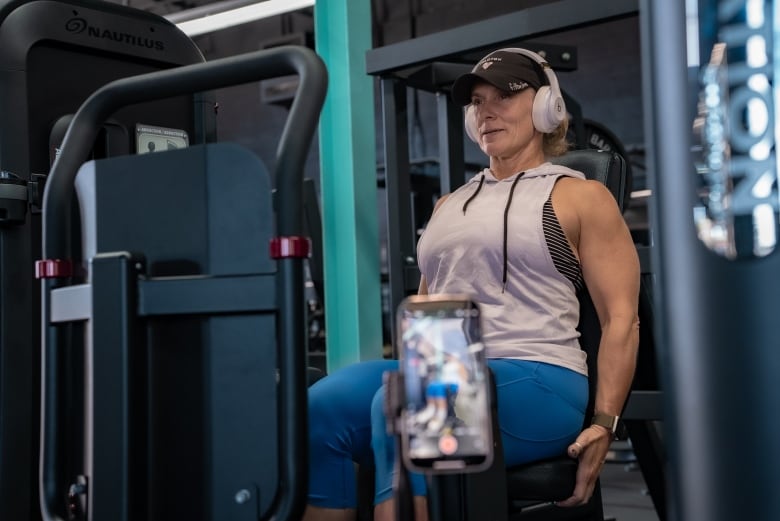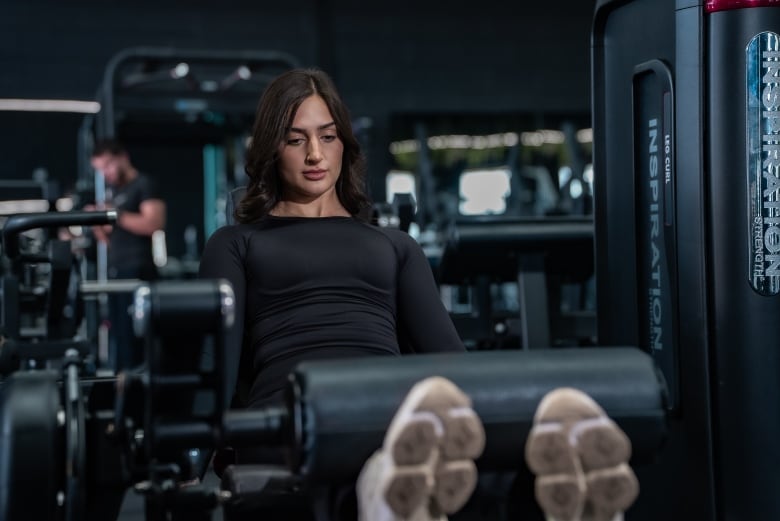Finding fitness tips on social media can be dangerous – but it doesn’t have to be | CBC News
This story is part of CBC Health’s Second Opinion, a weekly review of health and medical science news emailed to subscribers on Saturday mornings. If you haven’t registered yet, you can do so at to click here.
Tripods and cameras are scattered between weights and benches at a Mississauga gym. It’s common to find fitness influencers at First Health Club – recording videos of themselves pumping iron to post on social media.
Among them is Chelsey Berestecki, 25, a young mother who started posting fitness videos on TikTok and Instagram a few months ago, after years of consuming such content while trying to lose weight .
“When I had my son in 2017, I gained a lot of weight during pregnancy. I was 260 kilograms,” he said. “In the last four years, I have lost more than 100 kilograms.”
“I would look at TikTok influencers in the fitness industry and kind of… I feel like that’s the kind of life I want to live.”
It’s a feeling she says often pushed her to eat healthy and go to the gym, even when she didn’t want to.
Just a few months since she started posting, she already has over 8,000 followers – and growing – on TikTok.
Although it has been good for him, fitness news on the internet often has negative messages. Posts can be misleading. At worst, they can cause serious harm, either by encouraging overeating or encouraging exercise that is not safe for everyone.
Despite the growing popularity of exercise stimulators, their health effects have not been well researched. A growing number of studies are beginning to fill in the blanks — and even offer solutions.
One man’s meat, another man’s poison
A recent study from the journal Body Image it gives us one first impression. After analyzing 200 videos from popular TikTok hashtags, such as #fitness, #gymtok, #fittok, Australian researchers. found 60 percent of videos posted by fitness influencers presented false or harmful information.
The authors say that most of the people who post the videos do not have the necessary training in what they were writing. Many of the videos also promoted negative messages, including sexism, objectification (for both men and women), shame and overeating.
“Raising the overall calorie deficit was a concern for them,” said Samantha Pryde, the study’s lead author and a PhD candidate at Flinders University in Adelaide, Australia. He says many of the videos recommended extreme calorie deficits, below public health recommendations, for weight loss.

“Ninety-five percent of the people posting the videos had no health, fitness or nutrition information,” he said.
Social media enables viewers to feel like they have a personal connection with the influencer. That artificial connection can make statements like “I did this to lose weight” or “here’s what I ate for the day” sound like persuasive, personalized advice, says Pryde.
Pryde said: “It’s almost like a friend telling them rather than a random person on TV or in a magazine.”

Personal trainer Jennifer Mulgrew, who works out of a Mississauga practice, understands how powerful one-on-one advice can be. He has tripods set up on one side of the gym, recording his workouts, too; not to post on social media, but to send customers as references of the correct form. He says he wins when he sees some of the exercises posted online.
“I just see a back injury happen or an injury happen,” he said.
A lot of people who move, haven’t done their homework, learning about the different muscle groups and how they work together, Mulgrew says. “They wanted to practice a lot on TikTok, or go viral and get a big name.”
But Mulgrew admits to reading fitness hashtags regularly. He sees some redeeming qualities.
“One thing I love about the impact world is that it’s making a lot of people healthier,” he said.
Physical stress
The Australian study is the first to look at the credibility of fitness influencers, or the content they post on TikTok. But there are many studies looking at the impact of social media on a healthy body.
Next Study of 2023which examined a sample of more than 21,000 teenagers from Australia, Canada, Chile, Mexico, the United Kingdom and the United States, found that more time spent on social media was associated with a greater likelihood of dissatisfaction’ lines.
“Our study results are not surprising to many people” said Karen Hock, lead author of the study, and a PhD candidate at the University of Waterloo’s School of Public Health Sciences.
He said: “If you see posts on the internet about fitspiration, and if you don’t have muscles, like the pictures you see, [that’s] has been associated with body dissatisfaction because you don’t meet the ideal standards you see online.”
He wants to know more about the ways in which social media platforms choose the videos they show users, especially when content is served without the user having to search for it or click on it.
“There needs to be more research on the social media algorithms themselves, because the algorithms can be reinforcing physical anxiety.”
From editing their faces on apps to getting plastic surgery, social media is fueling a movement among young people to change the way they look to meet unrealistic standards of beauty.
Inspiring influencers
But it may be possible to encourage influencers to create content that poses less risk.
There is some data to suggest how that might work. A team at the Harvard TH Chan School of Public Health conducted an experiment last year: they trained a group of influencers on best practices for promoting evidence-based mental health information, sharing digital content, holding practice sessions and even inviting others to the People’s Conference in Boston.
They then tracked, for about a month, how the content of the videos changed, comparing the trained influencers against a control group of influencers who had not been given the same training. They found that those who participated in the training were more likely to present evidence-based content.
“We know we have the ability to influence influencers,” said Matt Motta, the book’s lead author. study depending on the results.

“We’re taking the scientific evidence and giving it to people and saying, ‘We know you don’t mean to be wrong,'” said Motta, who is also a professor at Boston University’s School of Public Health.
“We found designers to be very willing partners.”
Motta thinks this model can be applied to the food and fitness space. Despite some unique challenges, such as deals from companies that sell products like diet pills, Motta is optimistic about the potential impact.
“This is a fixable problem,” he said.
“It just needs buy-in from all these partners.”
There are other initiatives underway to promote evidence-based health information on social media. For example, the World Health Organization and TikTok announced last month a year-round collaboration promoting evidence-based health information, and helping designers access training programs.
For content buyers, experts say balance and skepticism are key to passing on exercise content.
“We spend a lot of time getting information about health, food and exercise on social media and that in itself is not a problem,” said Pryde, a TikTok content analysis writer.
“When you’re looking for that information, you need to find reliable sources.”
Even fitness influencers themselves, like Berestecki, are taking that approach.
“I want to take everything with a grain of salt.”
#Finding #fitness #tips #social #media #dangerous #doesnt #CBC #News

